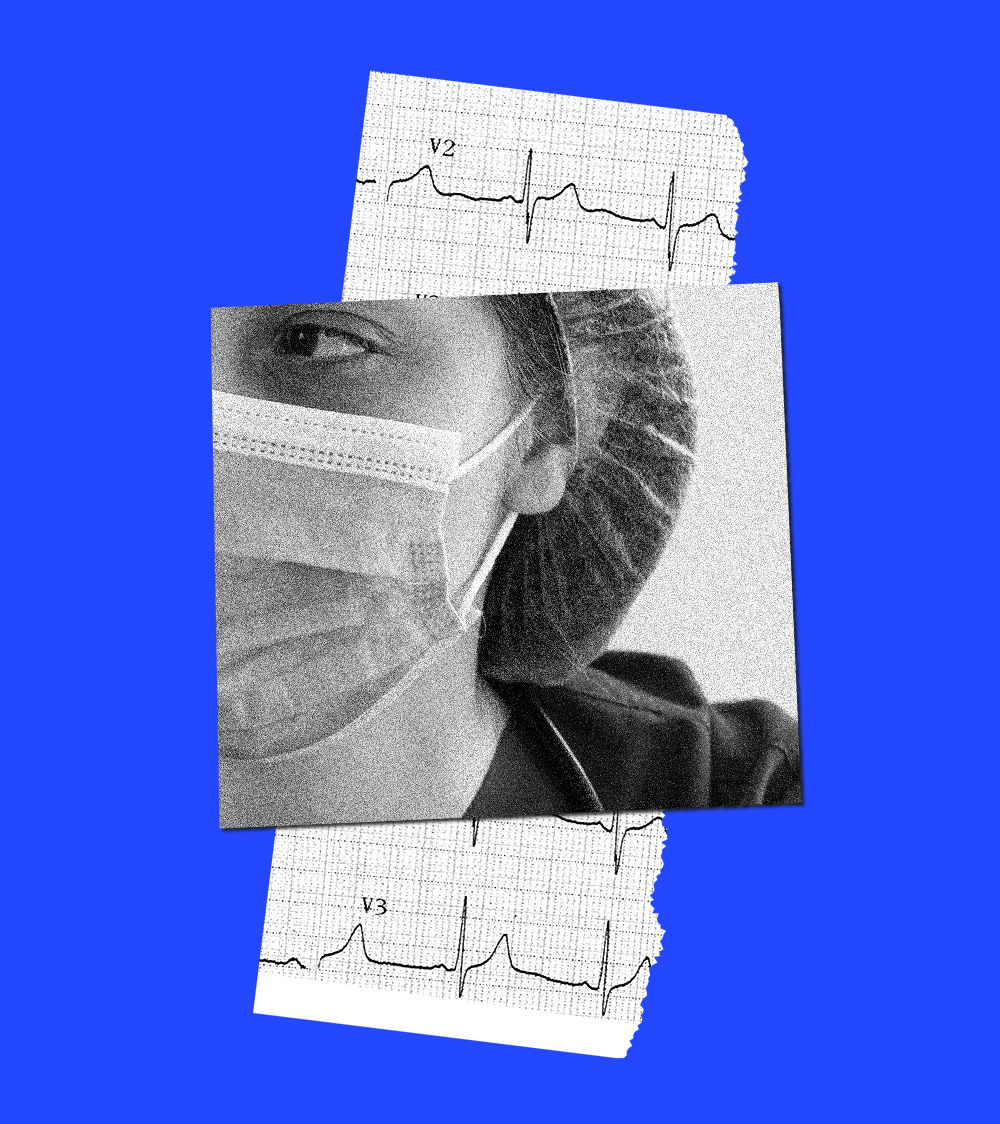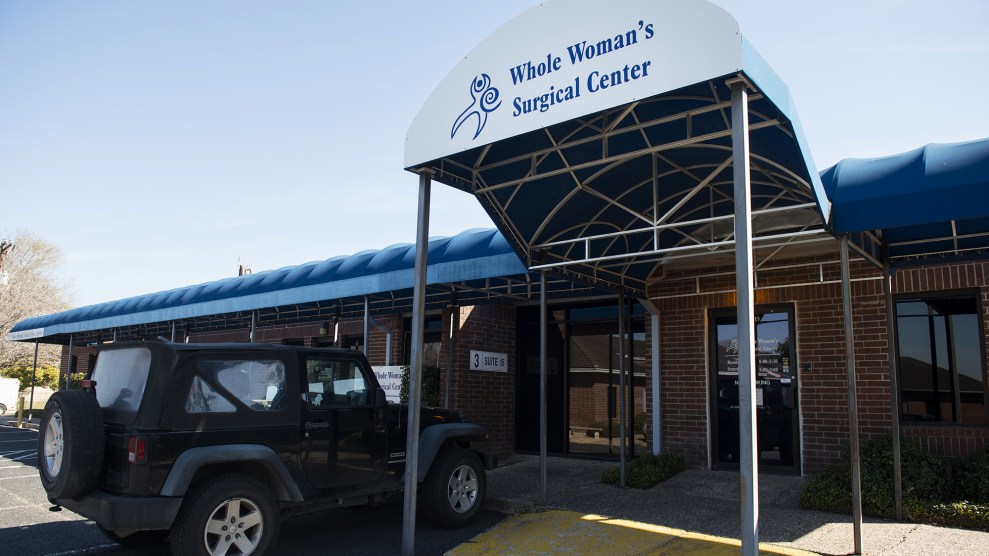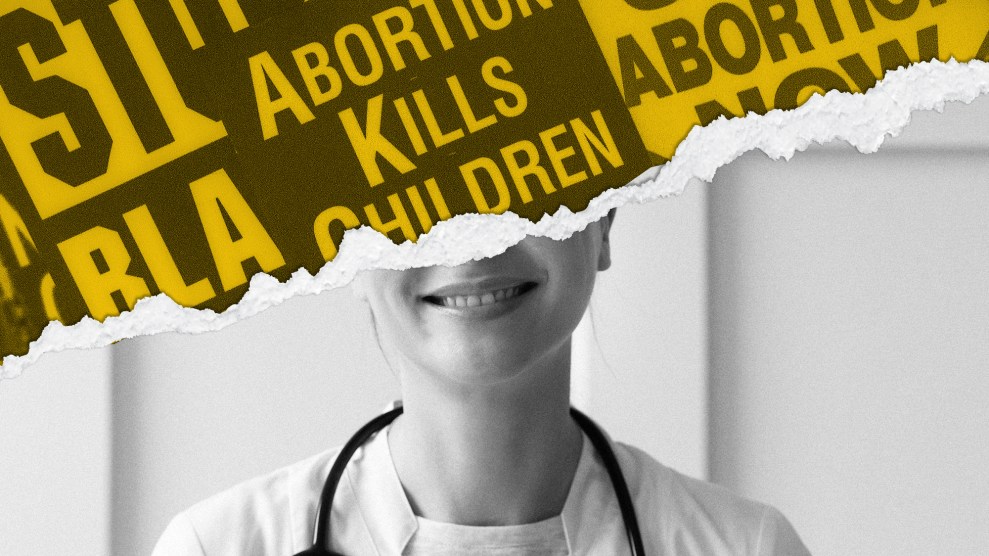As the federal right to abortion—and, by extension, the right to practice that aspect of gynecological care—has been destroyed, abortion providers in hostile states are reckoning with the very real possibility that their jobs may soon become totally illegal, and even that practicing medicine more broadly will get a lot thornier.
In Texas, obstetricians and gynecologists have been trying to walk that line since last year, when the state enacted a law, Senate Bill 8, that banned abortion at six weeks’ gestation and put out a bounty for anyone who “aided or abetted” a patient seeking the procedure. The only exceptions are for a direct threat to a pregnant person’s life or a disabling medical emergency that can be directly attributed to the pregnancy; nonviable pregnancies do not qualify. The burden to prove those circumstances falls squarely on the physician. Dr. Ghazaleh Moayedi, who has worked in abortion care in Texas for the past 18 years, talked to Mother Jones shortly before the Supreme Court ruled on Dobbs v. Jackson Women’s Health Organization about what this has meant for her own practice, how this has already greatly impacted her patients, and what the Supreme Court decision could mean for their future. Below is our conversation, as told in Moayedi’s own words, condensed and edited for clarity.
These sorts of tensions have existed in Texas longer than SB 8. Abortion bans in general create a conflict between evidence-based care and the best health care we can offer. Physicians and other health care providers are forced to balance the law with what’s best for the person in front of them. The medical decision and advice are guided by evidence against what the law says is an inherent conflict in all abortion restrictions.
I trained in Texas—I’ve been practicing in Texas for a long time—and I saw this tension as an OB-GYN resident in training before I was providing abortion care full-time in the state. But that conflict has really been heightened. Now, we’re really staring off the edge of the cliff with this Supreme Court decision pending.
Even prior to SB 8 abortion restrictions, Texas required us to delay care in accordance with the mandated 24-hour period, the proper state-mandated consent, state mandated-propaganda, the requirement that the same provider performs the ultrasound and the abortion, minor consent laws—all of those things have worked to delay lifesaving interventions for pregnant people.
The law makes it seem like medicine can be objective. The reality is that medicine is not a science at all, right? No person’s body is an algorithm that follows a direct course. Medicine is an art that is informed by science. We have patterns that we understand through observation and experimentation, but still, people are not machines. Each body is unique. I don’t think there’s a physician or nurse out there that can say, “Oh, yeah, I’ve seen it all.” Every single one of us sees something new, learns something new, almost every single day, and it adds to our understanding of what the human body teaches us. With SB 8 in effect, this has just gotten worse. I’m not even speaking about the very obvious restrictions on people accessing a human right to get abortion care; that baseline has dramatically changed. We know that people being denied abortions have long-term mental health consequences. We know when people are denied abortions, there are long-term effects on their children, on their families. But in the obstetric setting, abortion bans complicate pregnancies when people experience a medical problem. For example, with SB 8, every single hospital across the state has had to think about, What is near death? What’s our policy around near death? And what risks are we willing to take? Because it’s not clear.
I’ve had to have discussions in an obstetric setting of like, “Well, is this life-threatening enough? Well, no, we think her heart function is okay enough to live right now,” meaning it’s not deadly enough to warrant an exception to the emergency clause. We have to constantly have conversations with other physicians about where that line falls.
Separately from SB 8, our health and safety code says that a medical emergency means a life-threatening physical condition, aggravated by, caused by, or arising from a pregnancy that as certified by a physician places the woman in danger of death or a serious risk of substantial impairment of a major bodily function unless an abortion is performed. I would argue that any person being forced into a pregnancy that they do not want to carry is in danger of death or a serious risk of substantial impairment of a major bodily function. Not because people should fear pregnancy; I don’t want to be extreme about it. But it is not without complications. We are in a state that has a high maternal mortality rate, a high maternal morbidity rate, a high infant death rate [among vulnerable populations]. Being pregnant in a state like Texas is a dangerous baseline. Being forced to be pregnant in a state like Texas can be catastrophic. My colleagues and I are having to deal with this extremely broad law that is being individually interpreted at each hospital, at each clinic, at every practice. And it’s really just about personal and system risk mitigation. How much risk is a hospital system or clinic willing to take? How can we really prove that circumstances were, in fact, life-threatening? We have sham physicians in our legislature making all sorts of false claims about pregnancy and abortion, and so we can’t even trust the elected physicians in our state will use evidence, logic, or reason.
Regarding ectopic pregnancies—even ectopic pregnancy is not objective. It’s not that often that you do an ultrasound and say, “Oh, this is definitely an ectopic pregnancy.” It’s actually really rare to do an ultrasound and say, “Oh, yeah, I see that pregnancy in the tube.” Or, “Oh, yeah, I see that pregnancy in the ovary.” Ectopic pregnancy is a pregnancy that happens outside the uterus or not in the correct place in the uterus, but that means it could be in a lot of other places. A pregnancy can implant in the scar from a prior C-section. That means the placenta will grow through the C-section scar and into the bladder. There are cervical ectopic pregnancies where it implants into the cervix and grows there. There are ectopic pregnancies that grow on the liver. There’s been a documented case of someone that had a full-term delivery from an ectopic pregnancy, I am still shocked that they both survived. It is incredibly rare.
So again, there’s not an objective like, “Oh yeah, here’s definitely how you find an ectopic pregnancy. This is definitely how you diagnose it, and it is definitely clear what is ectopic or not.” So I think that is an important framing around all of this, that we’re talking about early pregnancy and an infinite possibility of abnormal implantation. All of this forms gray areas. So certainly we’ve seen—and I’ve heard of—stories where there is a pregnancy in the tube, and they’re refused care. This current law excludes treatment for miscarriage or ectopic pregnancy. And a tubal ectopic pregnancy, let’s say, is clearly excluded.
Personally, I have not been providing abortion care in abortion clinics in Texas since SB 8 went into effect. Until just recently, I’ve been traveling to Oklahoma to take care of people. [Editor’s note: Dr. Moayedi was forced to stop traveling to Oklahoma after the state banned abortion outright in May.] And so what I am hearing from my colleagues is that people are upset, confused, frustrated, begging for care, not sure what they can do. I also work as a general OB-GYN, including in Texas, so I do have to see people in the hospital at the brink of death. That is a constant discussion among all of our teams, and among up-and-coming physicians that I train, having to model and teach how we balance the law, the very real threat right now of civil liability, and after Roe falls, of imprisonment in our state if we practice medicine in an ethical way and prioritize our duty to serve our community.
I went to med school to be an abortion doctor. I definitely knew what was ahead. But I never thought that it might be possible for anyone to suggest or imply that a pregnant person can’t even leave the state to get abortion care. I never thought it might be possible that our laws could suggest or imply, no reasonable person would think that a physician traveling to another state to take care of someone could then be arrested because the person they took care of is from a state where it’s banned.
I feel very strongly about staying. Texas is my home. This is my community. This is where I trained. But I’m considering more and more what it might look like to leave. It’s extremely painful.

















